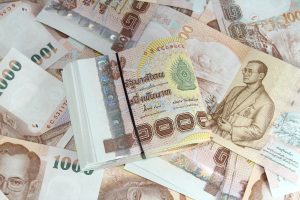Thailand’s Prime Minister Srettha Thavisin has, for several months now, been publicly pressuring the country’s central bank to lower interest rates. The Bank of Thailand has refused these requests, holding the benchmark interest rate at 2.5 percent over its last several meetings. With the central bank holding firm, Srettha turned directly to Thailand’s largest banks and asked them to reduce interest rates, which is kind of an unusual thing for a prime minister to do.
So why is the government in a showdown with the central bank over interest rates, and what does it mean for the Thai economy?
Interest rates in Thailand have, for much of the last decade, been very low. From March 2015 to November 2018 the policy rate was 1.5 percent. It then dropped to 0.5 percent during most of the pandemic.
Low interest rates have been a feature of the Thai economy for a couple of reasons. The first one is that it keeps the currency from strengthening too much. In an emerging market like Thailand, if interest rates go up it usually draws foreign capital into the country and as a result the currency appreciates. A strong baht is generally not something that Thailand wants, because the economy is heavily dependent on exports.
Another reason low rates are desirable is because Thailand has a lot of consumer debt. This is a long-term economic problem, but it’s less of an immediate issue if interest rates are low. As interest rates start rising, this consumer debt overhang becomes a more acute concern. So this is why, broadly speaking, low interest rates were an enduring feature of the Thai economy until the pandemic ended.
After the pandemic, however, the U.S. Federal Reserve started raising interest rates in order to cool inflation. Rates rose rapidly in the United States and it seems unlikely they will ease back in the short term. And like it or not, global financial flows tend to follow the Fed. When interest rates rise in the United States, it causes investors to pull money out of emerging markets like Thailand and shift it into assets like U.S. bonds. This kind of capital outflow can make a currency like the baht depreciate in value.
Now, here’s the paradox of being a central banker in an emerging market. If the baht is too strong, it will make Thailand less attractive as a tourist destination or export hub. But if the baht loses too much value too quickly, it can lead to capital flight that debases the currency and destabilizes the economy. This happened to Thailand in the 1990s, and they are highly motivated to avoid a repeat of that experience.
This means when interest rates rise in the U.S., the Thai central bank must also raise interest rates in order to prevent the baht from depreciating too rapidly. It will still depreciate, but it can be controlled through rate hikes and the use of foreign exchange reserves to intervene directly in capital markets. This is what the Bank of Thailand has been doing, and it is why they have raised the policy rate to 2.5 percent and kept it there even in the face of political pressure to lower it.
Prime Minister Srettha wants lower rates to ease the consumer debt burden, and also because his government has big fiscal spending plans such as its 500 billion baht digital wallet scheme. Financing such an undertaking would obviously be easier if interest rates were lower. But were the Bank of Thailand to heed Srettha’s directive and lower rates, the concern is that it would cause the baht to drop in value faster than rate-setters are comfortable with or otherwise make investors and global capital markets sour on Thailand.
This little dust-up perfectly illustrates the logic of having an independent central bank in the first place. For the last several decades, especially in liberal market economies, the belief that central banks must operate independent of political pressure has been more or less sacrosanct. The idea is that central bankers set interest rates according to technocratic considerations about what is best for the economy, not what is in the political interest of elected officials.
I don’t subscribe to this notion in its entirety, as it seems clear there are instances when monetary and fiscal policy should be deliberately coordinated to achieve certain economic objectives (Bank Indonesia’s monetization of public debt during the pandemic is one example). But Srettha putting so much direct pressure on the central bank to lower rates in this way, apparently without acknowledging the potential negative impact it might have on the currency, is probably not one of them.

































